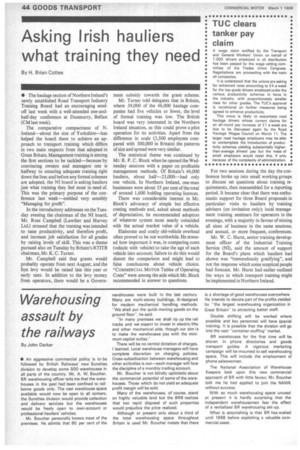Asking Irish hauliers what training they need
Page 46

If you've noticed an error in this article please click here to report it so we can fix it.
By H. Brian Cottee • The haulage section of Northern Ireland's newly established Road Transport Industry Training Board had an encouraging sendoff last week with a well-attended one-andhalf-day conference at Dunmurry, Belfast (CM last week).
The comparative compactness of N. Ireland—about the size of Yorkshire—has helped the board there to achieve an approach to transport training which differs in two main respects from that adopted in Great Britain. Management training is among the first sections to be tackled—because by convincing owners and managers one is halfway to ensuring adequate training right down the line; and before any formal schemes are adopted, the NI board is asking hauliers just what training they feel most in need of. This was the primary purpose of the conference last week—entitled very sensibly "Managing for profit".
In the introductory addresses on the Tuesday evening the chairman of the NI board, Mr. Ross Campbell (Lawther and Harvey Ltd.) stressed that the training was intended to raise productivity, and therefore profit, and increase job satisfaction for all grades by raising levels of skill. This was a theme pursued also on Tuesday by Britain's RT1TB chairman, Mr. K. C. Turner.
Mr. Campbell said that grants would probably operate from next August, and the first levy would be raised late this year or early next. In addition to the levy money from operators, there would be a Govern
ment subsidy towards the grant scheme.
Mr. Turner told delegates that in Britain, where 39,000 of the 46,000 haulage companies had five vehicles or fewer, the level of formal training was low. The British board was very interested in the Northern Ireland situation, as this could prove a pilot operation for its activities. Apart from the difference in scale (3,500 employees compared with 300,000 in Britain) the patterns of size and spread were very similar.
The statistical theme was continued by Mr. R. P. C. Block when he opened the Wednesday sessions with a paper on profitable management methods. Of Britain's 46,000 hauliers, about half-23,000—had only one vehicle. In Northern Ireland, one-man businesses were about 55 per cent of the total of around 1,600 holding operating licences.
There was considerable interest in Mr. Block's advocacy of simple but effective costing methods and, asked about methods of depreciation, he recommended adoption of whatever system most nearly coincided with the actual market value of a vehicle.
Elaborate and costly old-vehicle overhaul often proved to be not worthwhile. He stressed how important it was, in comparing costs (vehicle with vehicle) to take the age of each vehicle into account; failure to do this would distort the comparison and might lead to false conclusions about vehicle choice. "COMMERCIAL MOTOR Tables of Operating Costs" were among the aids which Mr. Block recommended in answer to questions.








































































































































































